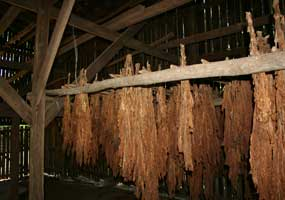- how Native Americans developed agriculture in Virginia, and why floodplains were significant
- what crops Native Americans grew initially
- how tobacco shaped the development of Virginia, and how the crop is still important today
- why the tobacco-growing experience of George Washington shaped the form of government in the United States today
- what are the primary farm commodities (crops and livestock) in Virginia today
- why wineries are such a fast-growing segment of Virginia agriculture/agritainment
NOTE: In K-12 classes, geography was often just memorizing "crops and capitals." In reality, geography is the science (and the art) of recognizing why you see what you see where you see it. As you have discovered by now, that requires sorting through facts to find patterns.
The facts are available on the Web, in various books, and on many maps. You've been exposed to a lot of different sources by now. You don't need to memorize any of the facts in this particular "Geography of Virginia" class, but you have to learn to sort through the mass of information to see the spatial patterns. In your history classes, you'll process many of the same facts as you focus on why certain things happened when they happened. Gaining skills in Virginia geography will enhance your ability to understand American history. It works the other way, too. The more you know about Virginia history, then the easier you may find it to grasp the spatial patterns, such as how the European settlement pattern was shaped by the rivers and the mountains.
As for crops and capitals - yes, we do cover those topics in this Geography of Virginia course. You already know why the capital started at Jamestown in 1607, and why the capital was moved to Richmond in 1699, and why the capital of Virginia was located in Wheeling, Virginia from 1861-1863 and in Alexandria from 1863-65 (at least according to the Restored Government of Virginia...).
This is the week you learn about Virginia crops, especially tobacco. Odds are, you're not living on a farm now and don't pay much attention to the price of pork bellies or winter wheat. However, even if you live in a city, you still care about protecting the open space in the suburbs and the rural areas of America. To understand the economics behind the conservation of parks and forests, you need to understand the environmental and economic impacts of agriculture.

burley tobacco, with leaves still attached to stalk and air-drying in barn
If you're a capitalist and you want to understand the economic structure of the state, you should recognize that growing trees (forestry) provides more reliable income than catering to tourists. If you ever run for elected office in a rural part of this state, be prepared to know about the shifting interests in peanuts, cotton, tobacco, and grapes - as well as the current price of hamburger in the grocery store, and the status of the latest Farm Bill in the US Congress.
In many districts, a key bloc of voters will expect you to know what we grow, and where we grow it, and how conservation proposals will affect the viability of commercial farming, before that group of voters will support your desire to be a public servant at the capital in Richmond... or Washington.
Week 10: From Tobacco Plantation to "Pharming" - Agriculture in Virginia
Class Syllabus and Schedule
Geography of Virginia